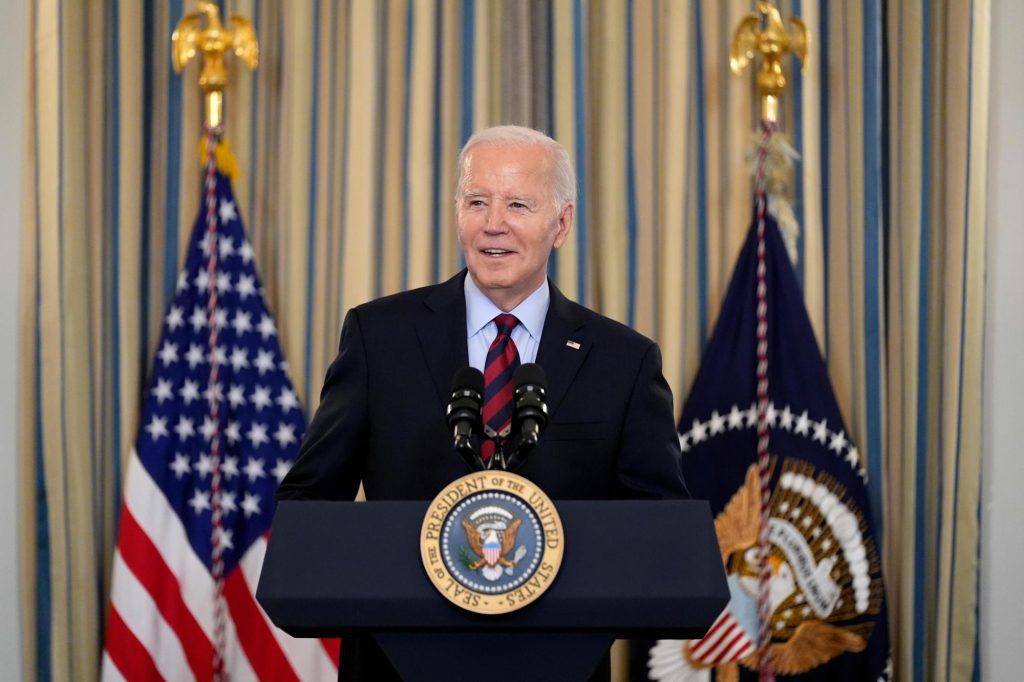By JOSH BOAK (Associated Press)
WASHINGTON (AP) — President Joe Biden is fully committed to addressing “shrinkflation.”
The term refers to a seemingly sneaky way for companies to raise prices by slightly reducing the size of their products. There’s suddenly less pretzels in the bag, less toothpaste in the tube and shorter candy bars.“It’s called shrinkflation,” Biden said in his State of the Union speech on Thursday night. “You get charged the same amount and you got about, I don’t know, 10% fewer Snickers in it.”
The president’s emphasis on shrinkflation is part of a broader plan to rethink how voters perceive the economy
before the November election. Biden is trying to redirect criticism about high prices and instead put the blame on big business. He also aims to demonstrate to everyday people that he’s fighting for them as he tries to persuade the public that the economy has improved He also is attempting to show everyday people that he’s fighting for them as he struggles
to convince the public that the economy has strengthened under his leadership. He talked about the shrinkflation issue in a video released on Super Bowl Sunday and highlighted a social media post by the “Sesame Street” character Cookie Monster that complained about smaller cookies.
The country’s low 3.7% unemployment rate and record 16 million applications to start new businesses have largely been overlooked by voters, who are dwelling on higher grocery and housing prices after inflation struck a four-decade high in June 2022 at 9.1%. Even as inflation has drifted down to 3.1% annually, shoppers are still worried about paying a premium at supermarkets.
“Joe Biden recognizes that high grocery prices are an ‘Achilles Heel’ politically,” said Ryan Bourne, an economist at the Cato Institute, a libertarian think tank. “When consumers are going into the grocery store, they remember that they’re paying more than they did in 2019.”
But Bourne cautioned that, in the alternative, companies might have simply raised their list prices without shrinkflation, possibly upsetting consumers more and hurting the president’s approval on the issue. Just 34% of U.S. adults say they agree with how Biden has handled the economy, according to polling by The Associated Press-NORC Center for Public Affairs Research.
“A number of companies did that because they thought that their customers would prefer it to paying higher headline prices,” Bourne said. “So I think the president should be very careful what he wishes for when he says he thinks shrinkflation is unfair.”
Sen. Katie Britt, R-Alabama, delivered the GOP response to the State of the Union and put the blame for inflation solely on Biden.
“His reckless spending dug our economy into a hole and sent the cost-of-living through the roof — the worst inflation in 40 years,” Britt said.
Republicans have claimed that prices jumped because of Biden’s $1.9 trillion pandemic relief package, even though the price increases were also global in nature. That’s a sign that broken supply chains and higher energy and food prices after Russia’s invasion of Ukraine played a role.
In a report published Wednesday, the liberal economic advocacy group Groundwork Collaborative examined the inflation numbers issued by the Bureau of Labor Statistics and found evidence of shrinkflation, indicating that it had a meaningful but modest impact on higher prices since 2019.
More than 7% of the rise in coffee prices came from smaller packaging. Around 10% of the increased prices for snacks and household paper products resulted from shrinkflation. And about 7% of the inflation for ice cream was caused by shrinkflation, which happens to be a favorite product of the president.
The report mentioned that companies may have hidden the price increases from customers, but were honest with investors during earnings calls. Some companies, like General Mills, also presented the reduced package sizes as a way to manage their own costs and address the issue of climate change.
The report noted that the snack company Utz reduced the size of its potato chip bags to 9 ounces. It also cut two ounces of pretzels from its pretzel jars, and the CEO highlighted to stock analysts the company's ability to manage what the industry refers to as “price pack architecture.” PepsiCo also decreased the size of its Frito Scoops bags, Gatorade bottles, and Doritos bags.
Linsday Owens, executive director of the Groundwork Collaborative, expressed that the reason for the current prevalence of shrinkflation is due to it being a late-stage ‘greedflation’ — when companies have pushed prices as far as they can, and consumers cannot bear another increase. Owens emphasized that it is much more deceiving than a simple list price increase.
Senator Bob Casey, D-Pennsylvania, has put forward a bill that aims to prohibit shrinkflation by instructing the Federal Trade Commission to consider it an unfair or deceptive practice, allowing the government to pursue civil penalties against companies that engage in it.
Biden wholeheartedly supported the measure in his speech.
He said, “Pass Bobby Casey’s bill and stop this.”
The president's attention to shrinkflation is part of a broader effort to change how voters perceive the economy before the November election.









